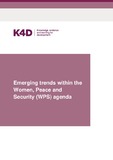| dc.contributor.author | Kelly, Luke | |
| dc.date.accessioned | 2022-03-03T14:24:45Z | |
| dc.date.available | 2022-03-03T14:24:45Z | |
| dc.date.issued | 2022-01 | |
| dc.identifier.citation | Kelly, L. (2022). Emerging trends within the Women, Peace and Security (WPS) agenda. K4D Emerging Issues Report 49. Brighton, UK: Institute of Development Studies. DOI: 10.19088/K4D.2022.019 | en |
| dc.identifier.uri | https://opendocs.ids.ac.uk/opendocs/handle/20.500.12413/17202 | |
| dc.description.abstract | This report has identified emerging issues within the women, peace and security (WPS) agenda. Climate change has long been identified as a key cross-cutting issue and several potential avenues for WPS policy are identified. Other issues such as artificial intelligence (AI) have been highlighted as potentially relevant, but relatively little discussed with respect to WPS.
The WPS agenda focuses on addressing the gendered impact of conflict and seeking to prevent conflict through increased women’s participation. In this report, WPS is understood as a body of UN Security Council resolutions (UNSCRs) and state national action plans (NAPs) labelled as WPS; as well as other UN and state policies using the language and ideas of WPS; and actions and ideas produced by civil society and academics inspired by the United Nations (UN) agenda or sharing ideas with it.
The report focuses on new and emerging issues identified by academics and policymakers as relevant to the WPS agenda. Emerging trends and issues are broadly understood as:
• Parts of the WPS agenda that are increasingly part of policies formulated by the UN, member states or civil society actors.
• Parts of the WPS agenda that scholars or policymakers think have been neglected or not implemented sufficiently.
• Re-interpretations of the framing of the WPS agenda.
• New areas to which it is argued WPS should be applied.
• Parallel international policy agendas with conceptual or legislative overlap with WPS.
Emerging trends and issues are discussed with reference to their status in policy and implementation; normative debates about their place in the WPS agenda; and evidence on their implications for and applicability to certain contexts. The report does not seek to predict or assess the future trends or their relative importance, beyond highlighted existing interpretations of their status, implementation and potential implications.
The report discusses a variety of emerging issues. These include issues where the WPS agenda has already been applied, but where its implementation –or lack thereof – has been criticised, such as in counterterrorism and arms control, or the conceptualisation of gender. The ability of WPS instruments to address changing forms of conflict has also been criticised. Issues to which it is argued that WPS should, and could, be applied more thoroughly, such as gang violence and trafficking, are discussed. The report includes new fields such as cybersecurity and AI, about which there is relatively little literature linked to WPS, but agreement that it may be relevant. | en |
| dc.description.sponsorship | FCDO (Foreign, Commonwealth and Development Office) | en |
| dc.language.iso | en | en |
| dc.publisher | Institute of Development Studies | en |
| dc.relation.ispartofseries | Emerging Issues Report;49 | |
| dc.rights.uri | https://www.nationalarchives.gov.uk/doc/open-government-licence/version/3/ | en |
| dc.subject | Gender | en |
| dc.subject | Security and Conflict | en |
| dc.title | Emerging Trends Within the Women, Peace and Security (WPS) Agenda | en |
| dc.rights.holder | © Crown copyright 2022 | en |
| dc.identifier.doi | 10.19088/K4D.2022.019 | |
| dcterms.dateAccepted | 2022-01 | |
| rioxxterms.funder | Default funder | en |
| rioxxterms.identifier.project | K4D | en |
| rioxxterms.version | VoR | en |
| rioxxterms.versionofrecord | 10.19088/K4D.2022.019 | en |
| rioxxterms.funder.project | 0986883a-6d0f-4bb8-9c46-5e0682934d65 | en |

